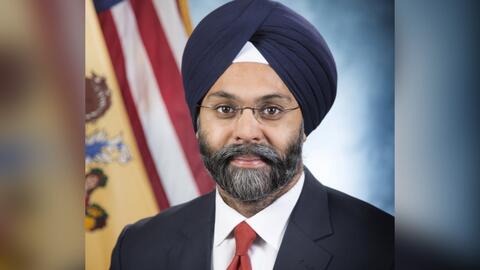Attorney General Gurbir S. Grewal announced today that the Trump Administration’s last-minute push to finalize dozens of rules and other actions that will harm the environment will not go unchecked.
In the waning days of the Trump Administration, Attorney General Grewal and other Attorneys General around the country have filed comments and lawsuits opposing more than a dozen “midnight rules.” More lawsuits are expected soon.
“EPA and other agencies of the Trump Administration have been engaged in a non-stop, reckless campaign to deregulate, with little or no regard for science, the law, or the health and safety of Americans – particularly those in our environmental justice communities,” New Jersey Governor Phil Murphy said. “This Administration has put our environment and the wellbeing of New Jersey residents at risk in pursuit of an agenda that seems founded on a commitment to invite more pollution and demand less accountability. We don’t expect them to quit until they have to, and we will be there until the last hour pushing back.”
Attorney General Grewal has led and joined dozens of actions to oppose Trump Administration environmental rollbacks since taking office in 2018, but the pace of the rollbacks has accelerated in the Administration’s final days.
“In the last few months, the Trump Administration’s four-year race to roll back environmental protections has turned into a sprint,” Attorney General Grewal said. “Many of those rollbacks were undertaken without regard to the science, the law, or the effects on human health. We have pushed back on unlawful policies that put New Jersey’s residents and environmental resources at risk, and we will continue to push back on rules jammed through during the Administration’s waning days.”
Many of the Trump Administration’s last-minute “midnight rules” will be short-lived. A federal law called the Congressional Review Act provides a quick path for Congress to override an outgoing Administration’s rules and prevent the future adoption of substantially similar rules.
Other rules are likely to be struck down in court, and the Biden Administration may repeal or update additional rules.
Recent environmental rules adopted by the U.S. Environmental Protection Agency (EPA) and other federal agencies over objections from New Jersey include the following:
- An EPA rule maintaining the national ambient air quality standard for ozone at a level that fails to protect public health and welfare based on the existing scientific evidence.
- An EPA rule that unlawfully and arbitrarily limits the scientific evidence that the agency can consider when adopting rules and standards to protect human health and the environment.
- An EPA rule that will skew how the agency weighs the costs and benefits of rules under the Clean Air Act by excluding important public health benefits from the analysis while inflating the costs.
- An EPA rule that will allow major sources of hazardous air pollutants to reclassify themselves as less regulated “area sources” under the Clean Air Act, abandoning the “once-in, always-in” policy that had been in place for 25 years.
- An EPA rule weakening the Clean Air Act’s new source review program for major modifications to existing major stationary sources of emissions.
- An EPA rule on greenhouse gas emission standards for airplanes that fails to adequately mitigate public health and environmental harms from impacts of climate change.
- Rules from the U.S. Fish and Wildlife Service and National Marine Fisheries Service that will make it harder to protect endangered and threatened species by narrowly defining critical “habitat” and establishing a skewed process for excluding areas from critical habitat designations.
- A rule from the U.S. Fish and Wildlife Service that rolls back protections for migratory birds after New Jersey and other States successfully challenged an earlier version of the policy in court.
- A Department of Energy rule reducing conservation standards for clothes washers and dryers.
- An EPA risk evaluation for 1,4-dioxane that does not adequately protect consumers from this commonly used solvent.
In addition to the comments opposing these rules, Attorney General Grewal has already filed several lawsuits and amicus briefs challenging last-minute actions by the Trump Administration that undermine environmental protection. Recent court filings include:
- A challenge to an EPA rule maintaining the national ambient air quality standard for particulate matter at a level that fails to protect public health and welfare based on the existing scientific evidence.
- Litigation challenging multiple rushed actions by federal agencies to allow oil and gas development on the Arctic National Wildlife Refuge, a national treasure and the country’s largest refuge.
- A challenge to a Department of Energy rule reducing conservation standards for residential dishwashers.
While these comments and lawsuits have targeted the Trump Administration’s last-minute actions, other recent court filings by Attorney General Grewal challenge the Administration’s failure to act consistently with its legal obligations to protect the environment. These include:
- In November 2020, New Jersey joined a multi-state lawsuit challenging the Department of Energy’s failure to meet federal deadlines for reviewing and strengthening energy standards for 25 consumer and commercial or industrial product categories.
- In December 2020, the State filed a brief challenging EPA’s delays in regulating sulfoxaflor, a pesticide that is toxic to bees, under the Federal Insecticide, Fungicide, and Rodenticide Act.
- On January 12, New Jersey joined other States and the City of New York in a lawsuit over EPA’s failure to act on upwind states’ implementation plans for reducing ozone pollution that affects downwind states.
Attorney General Grewal said that “New Jersey welcomes the incoming Biden Administration’s renewed focus on combatting climate change and promoting environmental justice while rebuilding the economy. We look forward to collaborating with the new Administration to enforce our environmental laws and strengthen federal environmental protections.”
